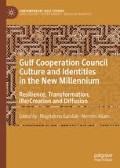Abstract
This chapter introduces the theoretical framework of the volume looking at the concepts of identity and culture broadly speaking and placing them within the context of the Arabian Gulf. The introduction interrogates the scope of the khaleeji versus national cultures of these, mostly young, statehood creations. Furthermore, the chapter describes the social, political, and economic trends in the twenty-first century that help explain the rapid pace of change. Within this context, the need of anchoring an identity of each of the Gulf Cooperation Council (GCC) states is pervasive, often operates as a state project. The search for what could constitute a continuity is nonetheless all the more elusive as various stakeholders actively create and recreate various elements of regional, national, and group identities. Yet, these transformations occur on different levels, formal and informal, planned and random. The rapidity of changes prompted by the unprecedented development of the region accounts for the fluidity of the concepts the volume describes. This chapter raises also important questions on the future trends and challenges that GCC countries face. Ultimately, the introduction provides an overview of the chapters contained in the volume presenting the linking theme between them.
Access this chapter
Tax calculation will be finalised at checkout
Purchases are for personal use only
References
Al-Rasheed, M., & Vitalis, R. (Eds.). (2004). Counter-Narratives: History, Contemporary Society, and Politics in Saudi Arabia and Yemen. Softcover reprint of the original 1st ed. 2004 edition. New York: Palgrave Macmillan.
Alsharekh, A., & Springborg, R. (2012). Popular Culture and Political Identity in the Arab Gulf States. London: Saqi.
Bristol-Rhys, J. (2010). Emirati Women: Generations of Change. New York: Columbia University Press.
Cooke, M. (2014). Tribal Modern: Branding New Nations in the Arab Gulf. Berkeley: University of California Press.
Dresch, P., & Piscatori, J. (2005). Monarchies and Nations: Globalisation and Identity in the Arab States of the Gulf. London/New York: I.B.Tauris.
Erskine-Loftus, P., Al-Mulla, M. I., & Hightower, V. (Eds.). (2016). Representing the Nation: Heritage, Museums, National Narratives, and Identity in the Arab Gulf States (1st ed.). London/New York: Routledge.
Fargues, P. (2011). Immigration Without Inclusion: Non-Nationals in Nation-Building in the Gulf States. Asian and Pacific Migration Journal, 20(3–4), 273–292.
Fox, J., Sabbah, N. M., & Mutawa, M. A. (Eds.). (2006). Globalization and the Gulf (1st ed.). London: Routledge.
Herb, M. (1999). All in the Family. Albany: State University of New York Press.
Keshmirshekan, H. (2015). Contemporary Art from the Middle East: Regional Interactions with Global Art Discourses. London/New York: I.B.Tauris.
Khuri, F. (1980). Tribe and State in Bahrain. Chicago: The University of Chicago Press.
Lawson, F. H. (2012). Transformations of Regional Economic Governance in the Gulf Cooperation Council. CIRS Occasional Papers. Available at SSRN: https://ssrn.com/abstract=2825915 or http://dx.doi.org/10.2139/ssrn.2825915
Luciani, G., & Beblawi, H. (1987). The Rentier State. New York: Croom Helm.
McKeown, S., Haji, R., & Ferguson, N. (2016). Understanding Peace and Conflict Through Social Identity Theory: Contemporary Global Perspectives. Cham: Springer.
Mersmann, B. (2017). Image Enhancement Through Copying? Global and Local Strategies of Reproduction in the Field of World Art and Heritage. In C. Forberg & P. W. Stockhammer (Eds.), The Transformative Power of the Copy: A Transcultural and Interdisciplinary Approach (pp. 243–268). Heidelberg: Heidelberg University Publishing.
Popescu, M., & Mustafa, S. (2001). The Gulf Monetary. Unification: Opportunities and Challenges. Arab Bank Review, 3(1), 28–40.
Potter, L. G. (Ed.). (2014). Sectarian Politics in the Persian Gulf. Oxford/New York: Oxford University Press.
Author information
Authors and Affiliations
Corresponding author
Editor information
Editors and Affiliations
Rights and permissions
Copyright information
© 2020 The Author(s)
About this chapter
Cite this chapter
Allam, N., Karolak, M. (2020). Introduction. In: Karolak, M., Allam, N. (eds) Gulf Cooperation Council Culture and Identities in the New Millennium. Contemporary Gulf Studies. Palgrave Macmillan, Singapore. https://doi.org/10.1007/978-981-15-1529-3_1
Download citation
DOI: https://doi.org/10.1007/978-981-15-1529-3_1
Published:
Publisher Name: Palgrave Macmillan, Singapore
Print ISBN: 978-981-15-1528-6
Online ISBN: 978-981-15-1529-3
eBook Packages: Political Science and International StudiesPolitical Science and International Studies (R0)

